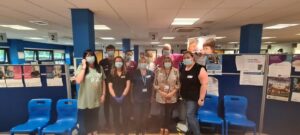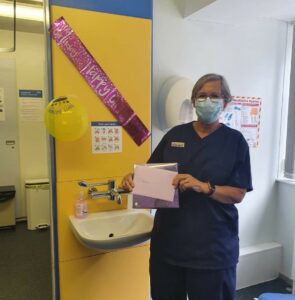North West COVID-19 vaccination programme newsletter – Issue 11
Dear colleagues,
England’s success in reaching the finals of the Euros has helped us reach more people with the COVID-19 vaccine.
We ran a powerful communications campaign, urging people to “keep COVID-19 offside”, and “when your moment comes take the shot” which saw thousands of people have their vaccinations at clinics across the North West, some close to venues where key matches were screened.
It was supported by films, including one made by new goalkeeper for Bolton Wanderers FC, Joel Dixon, and by media coverage (see below).
Importantly it helped to promote our increased numbers of walk-in and mobile clinics to younger audiences, who are the cohort most recently invited to make an appointment.
Almost 60% of 18 to 29-year-olds in the North West have now had their first dose and we have given 8.6 million vaccinations overall. That is made up of more than 4.8 million first doses, reaching 86% of our adult population (based on mid-2019 ONS population estimates) and 3.8 million second doses, 67.7% of our adult population.
In line with national guidance, we are now offering the second dose to everyone eight weeks after the first, rather than having different waits for different age groups. Along with the opening up of vaccinations to all adults in June, this means there is one simple set of guidance for everyone, which helps with clarity of messaging.
It has been good to see the humour and creativity of NHS communications colleagues getting across the importance of the second dose in a lighthearted way, as in this film.
We are on track to hit the national target to offer everyone aged 18+ a first dose by 19 July and have already fully vaccinated more than two thirds of adults, ahead of the removal of legal restrictions on social contact, settings and life events.
It is wonderful to be playing such an important part in allowing the country to open up again. At the same time, it remains vitally important that we continue to do everything we can to ensure no one misses out on having their first or second dose.
A real focus for us is vaccinating people in cohort 6 – those aged 16 to 64 with underlying health conditions which put them at higher risk of serious disease and mortality, and adults who are family carers, or live with people who are immune suppressed. While many in this group were vaccinated when they first became eligible, others waited. They or those who depend on them or who they live with are at higher risk of hospitalisation and needing intensive care than the general population so it is very important they get the protection of vaccination. More about this below.
We are also supporting other people from the most vulnerable groups (cohorts 1-9) who continue to come forward for their first vaccination as part of our evergreen offer, as well as younger people.
Our other major focus is preparing for the next phase of the COVID-19 vaccination programme in partnership with the seasonal flu vaccination programme, so we are able to work together to protect our population.
We will be ready to deliver booster jabs against COVID-19 from early September for everyone aged 50+. The Joint Committee on Vaccination and Immunisation has already issued interim advice on the best way to do this, targeting more vulnerable groups first, and an enhanced service specification has been shared with general practice and community pharmacies.
It was very good to see the finding by Public Health England that COVID-19 vaccines give a high degree of protection against symptomatic disease to most people in clinical risk groups, including people who are immunosuppressed. Protection against hospitalisation and death is likely to be higher still, as in the general population.
We continue to be exceptionally busy and I would like to thank everyone in the NHS and our partners who are helping to deliver vaccinations to protect the people of the North West.
Do share your thoughts on this newsletter and let us know what else you would like it to contain. If you are a frontline health and care worker and not already a member of the North West Community of Practice, please see details at the end for how to join so you can access documents and other resources, and share your tips, challenges and experiences.
Yours
Linda
Dr Linda Charles – Ozuzu
Regional Director of Commissioning and Regional SRO – COVID Vaccination Programme
NHS England and NHS Improvement – North West
Latest news
Tackling health inequalities
We are looking with renewed focus at cohort 6, which comprises people aged 16 to 64 at risk including people with a learning disability or severe mental illness, the adult household contacts of people with immunosuppression, and adult carers who are eligible for a carer’s allowance or who are the primary carer of a clinically vulnerable person.
Uptake in cohort six in the North West as a whole is 83%, though this masks differences between age groups. Uptake is above 90% in people aged 50 and over, dropping to over 80% in people aged 40 to 49, over 70% to people aged 30 to 39, and over 65% in people aged 18 to 29.
About 150,000 people are still to be vaccinated, with the highest number among people in their 30s. Uptake in each of the main cohort 6 sub-groups – those who are themselves at risk and those in close contact with others at risk – is similar, although there is evidence of lower uptake by people living with a severe mental illness.
As seen in other cohorts, uptake is lower in younger age groups, men, people from minority ethnic backgrounds – particularly in Black communities – and in more deprived areas. We have identified 20, mainly larger, primary care networks (PCNs) in deprived urban areas, which have lower uptake, and which are working particularly hard on this.
Approaches to encourage people in cohort 6 to get vaccinated include:
- a fresh round of targeted invitations
- identifying people who are afraid of going out to have their vaccine and arranging for them to be vaccinated at home
- refreshed and updated communications, with a particular emphasis on safety for specific underlying conditions
- a tailored approach for carers
learning from PCNs with similar patient demographics that achieved higher rates of uptake.
Making reasonable adjustments
Much of our success in increasing uptake in communities which were initially hesitant about taking the vaccine is due to making reasonable adjustments to services to meet people’s needs.
Research shows that three key elements determine how likely people are to be vaccinated:
- confidence in the vaccine’s safety and effectiveness
- convenience – how easy it is for people to access
- complacency – how concerned people are about their risk of infection or serious illness, with those who are complacent being less likely to take up vaccination.
There are suggestions in our Menu of Reasonable Adjustments (MoRA) to help you maximise vaccination uptake among under-served communities, including people from an ethnic minority background, people with a learning disability, people with serious mental illness, and inclusion health populations.
Birthday vaccinators

Pharmacist John Davey (pictured back row, right) spent his 58th birthday with his team from Davey’s Chemist vaccinating 220 people at the Kirby One Stop Shop in Knowsley, at the request of the local PCN. John said: “It was great. A lot of people came in who otherwise would not have availed themselves of the vaccine. It was a really rewarding thing to do and I celebrated my birthday with the family in the evening.”
Retired nurse Jeanette McGrogan (pictured) spent her 62nd birthday vaccinating at the Plant Hill clinic, in north Manchester. Jeanette, her husband Liam, a retired GP, and their daughter Fiona, a practising nurse, have all been vaccinating patients at Plant Hill since January. As well as vaccinating literally thousands of people, Jeanette has a special way with patients who are scared of needles. Depending on their needs she may have a calming chat with them in a quiet corner, teach them deep breathing techniques, or even vaccinate them on a bed to allay fears of fainting. “It’s so rewarding,” she says. “You really feel like you’re contributing.”
Webinar
The webinar below is open to anyone with an interest in COVID vaccine equalities (with booking link):
- Thursday 15 July, 1.30 – 2.30 Supporting people with learning disabilities and/or autism to access the COVID-19 vaccine. This is the final webinar in the national summer series. Attendees will hear from an expert by experience who will share his vaccine story, as well as frontline vaccinating teams at a local PCN and Salford Royal.
People working in local, public, voluntary and NHS organisations can join the COVID Vaccine Equalities Connect and Exchange Hub on the Future NHS platform, using this link.
Further information
Media coverage
- https://www.inyourarea.co.uk/news/north-west-vaccine-lead-urges-residents-to-get-jabbed-ahead-of-euro-2020-final/
- NHS ‘Grab A Jab’ mass vaccination event happening at Sefton Park this weekend – The Guide Liverpool
- https://www.liverpoolecho.co.uk/news/liverpool-news/drop-covid-vaccination-sites-open-21010565
- https://www.manchestereveningnews.co.uk/news/greater-manchester-news/free-taxis-manchester-residents-hoping-21010307
- https://www.itv.com/news/granada/2021-07-07/the-changing-face-of-covid-at-a-merseyside-hospital
Useful resources
A wide range of resources and case studies are available on the North West Community of Practice website.
Questions and feedback
If you have any questions or comments on this newsletter, please post them on the North West Community of Practice forum.
The North West Community of Practice is for everyone working in health and care in North West region. If you are working in this field and would like to become a member, please email england.pcn-development@nhs.net to request an invitation.
